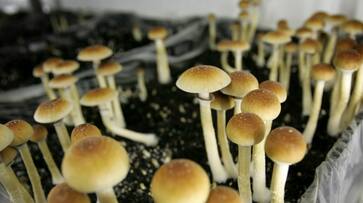SHOCKING! In a rare case, Austria man amputates penis with axe after consuming 'magic' mushrooms
In an extraordinary and deeply unsettling case, Austrian doctors have documented what is believed to be the world's first instance of psilocybin-induced penile amputation. A 37-year-old man battling depression and alcohol dependency reportedly severed his penis with an axe after consuming a significant quantity of magic mushrooms.

In an extraordinary and deeply unsettling case, Austrian doctors have documented what is believed to be the world's first instance of psilocybin-induced penile amputation. A 37-year-old man battling depression and alcohol dependency reportedly severed his penis with an axe after consuming a significant quantity of magic mushrooms. Miraculously, surgeons managed to reattach part of the organ. This alarming case has been meticulously detailed in the Mega Journal of Surgery.
According to a report in Psypost, Psilocybin, the psychoactive compound in magic mushrooms, has long been known for its mind-altering effects. Upon ingestion, psilocybin is converted into psilocin, which interacts with serotonin receptors in the brain, inducing hallucinatory experiences, shifts in time perception, and intense emotional fluctuations. Historically, ancient cultures revered this psychedelic substance for its spiritual and ritualistic properties.
In recent years, however, psilocybin has garnered renewed interest for its potential therapeutic applications, particularly in treating conditions like depression, anxiety, and PTSD. Groundbreaking studies suggest that psilocybin could offer relief to patients with treatment-resistant depression, providing a beacon of hope where traditional methods have failed.
Beyond its clinical promise, psilocybin has captivated neuroscientists, offering a unique window into the brain’s architecture. By studying its effects, researchers hope to unlock the mysteries of consciousness, emotional regulation, and self-identity. These revelations could pave the way for revolutionary treatments for mental health disorders.
However, this remarkable case in Austria underscores the severe risks associated with psilocybin when taken outside of controlled environments. In rare instances, as this case starkly illustrates, psilocybin can provoke catastrophic psychological reactions, especially in individuals with pre-existing mental health challenges.
The tragic event unfolded when the man, isolated in a remote vacation cabin, consumed four to five dried psilocybin mushrooms. Shortly after, he descended into a terrifying psychotic episode. According to the case report, the man hallucinated or became delusional, prompting him to use an axe to mutilate his genitals. Although his memory of the incident remains fragmented, the aftermath was harrowing.
The man, bleeding profusely, tied a makeshift tourniquet around his groin and placed the severed parts of his penis in a jar of snow before stumbling outside in search of help. Fortunately, a passerby encountered the disoriented man and immediately alerted emergency services. After a five-hour delay, he was transported to a hospital.
By the time he arrived, he was in critical condition, having lost a substantial amount of blood. Surgeons faced the daunting task of salvaging the severely damaged organ, which was contaminated by dirt and snow. Despite the grim circumstances, they successfully reattached the glans and a small portion of the penile shaft, though much of the organ was too damaged to save.
Also read:
While the surgical reattachment was an unexpected triumph, the man’s ordeal didn’t end there. He continued to endure severe psychotic symptoms, including auditory hallucinations and religious delusions. Psychiatric intervention, including antipsychotic medications, helped stabilize his mental state. A week later, he was transferred back to the urology department to continue his recovery.
The road to recovery was fraught with challenges. The patient developed necrosis on the glans, likely due to the extended period of blood deprivation. Nevertheless, he regained partial erectile function within three months of surgery. However, the overall length of his penis was significantly reduced, and a complication known as hypospadias occurred, causing the urethral opening to shift further down the shaft.
This case—though the first recorded instance of psilocybin-induced self-amputation—sheds light on a broader phenomenon: the rare but extreme self-mutilation associated with psychosis, known as Klingsor syndrome. These tragic episodes, often involving self-inflicted genital injuries, are typically linked to severe psychiatric disorders such as schizophrenia or drug-induced psychosis.
Case reports like this one are invaluable to the medical community, offering real-world insights into the risks and complexities of treatment. While psilocybin shows tremendous promise in carefully controlled therapeutic settings, this harrowing event serves as a sobering reminder of its potential dangers when misused. As research into psychedelics continues, such cases will likely inform future safety guidelines and screening protocols to prevent similarly devastating outcomes.
The case report, "Penile Replantation after Self-Amputation Following Psilocybin-Induced Drug Psychosis," was authored by Dr. Andreas P. Berger and Dr. Alfred Hobisch.

 subscribe to Asianet Newsable WhatsApp channel by clicking here.
subscribe to Asianet Newsable WhatsApp channel by clicking here.












